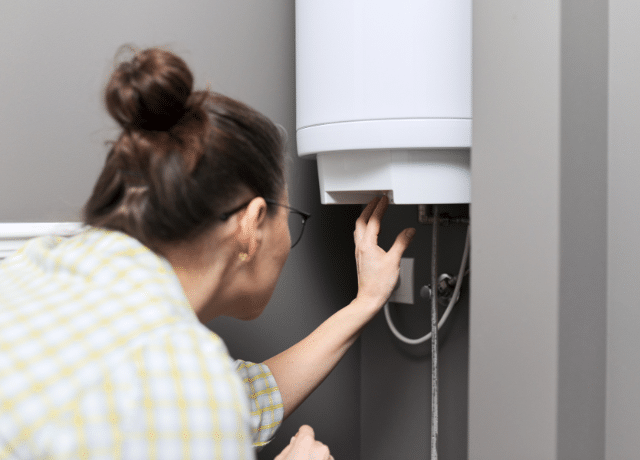When Tankless Water Heaters Boost Residential Benefits
When Tankless Water Heaters Boost Residential Benefits
Blog Article
Just how do you really feel about 5 Benefits of Tankless Water Heaters?

In a world where comfort and effectiveness preponderate, it's not a surprise that home owners are frequently on the lookout for smarter ways to manage their home's power consumption and convenience. One innovation that has actually progressively gotten appeal is the tankless hot water heater. But what exactly makes these systems attract attention from the conventional tank-based versions most of us matured with? Let's dive in and discover the advantages of tankless water heaters, helping you make a decision if it's time to make the switch in your house.
Introduction
Picture this: you enter the shower after a long day, anticipating a calming waterfall of hot water, just to be greeted by icy droplets due to the fact that the last individual used everything up. Audio familiar? Standard hot water heater store a set amount of hot water, indicating you go to the grace of that container's supply. Tankless systems, on the other hand, heat water on demand. Say goodbye to running out mid-shower, say goodbye to fumbling with timetables just to guarantee hot water is available.
Understanding Tankless Hot Water Heater
What Are Tankless Water Heaters?
Tankless hot water heater, often known as on-demand or instant water heaters, offer warm water just as it's needed. Instead of storing gallons of pre-heated water, these units kick right into action the minute you activate the faucet. Water goes through a heat exchanger, warming up in real-time, indicating you obtain an undisturbed flow of warm water without the requirement for a large storage tank resting idly by.
Exactly how Do They Differ from Conventional Systems?
Conventional heaters hold a tank of hot water, utilizing energy to keep that container at a consistent temperature. Tankless systems eliminate the standing supply, cutting down on lost energy and the cumbersome impact of a huge cylinder. Basically, you're upgrading from a "stockpile" state of mind to a "made-to-order" method.
Typical Sorts Of Tankless Systems
Tankless water heaters normally come in two varieties: gas and electric. Gas models often tend to supply greater flow prices, perfect for bigger houses, while electrical versions typically serve smaller homes and are typically easier to mount. Additionally, some systems are designed for point-of-use (offering one fixture) while others can handle the whole home's hot water demands.
Trick Advantages of Tankless Hot Water Heater
Energy Performance and Expense Savings
Say goodbye to heating up a titan container's well worth of water and maintaining it cozy all day. Tankless heating units decrease standby energy losses, which can decrease energy expenses. While the preliminary expense may be greater, the long-term savings often warrant the financial investment.
3. Space-Saving Style
If your home is short on storage, removing the cumbersome storage tank maximizes valuable room. Tankless systems are compact and can often be placed on walls, concealed in corners, or mounted in tight utility wardrobes without having all to oneself the entire area.
4. Longer Lifespan
A well-kept tankless hot water heater can outlive its tank-based relative. Conventional storage tanks may last 10-15 years, while tankless versions can maintain chugging along for twenty years or more, making them a solid financial investment over time.
1. Countless Warm Water Supply
Ever needed to arrange showers so everyone obtains their reasonable share of hot water? With tankless, that becomes a thing of the past. As long as the heating unit's flow capability isn't surpassed, you can take back-to-back showers without developing into a popsicle.
5. Improved Water Top Quality
Saving water in a container can occasionally bring about debris accumulation or a somewhat "off" taste. With tankless systems, fresh water is heated on the spot, reducing the opportunities of sediment accumulation and potentially offering cleaner-tasting water.
Factors to consider Before Changing
Though the advantages are engaging, it's wise to take into consideration a few factors prior to completely committing.
Reviewing Your Home's Water Use Patterns
If your home simultaneously makes use of several components with high hot water need, make sure the device's circulation rate fulfills your needs. Understanding your use patterns helps you choose the right size and type of tankless heater.
Upkeep and Treatment Tips
Tankless systems are relatively reduced upkeep, but they aren't set-it-and-forget-it devices.
Regular Cleansing and Descaling
Difficult water minerals can develop in the heat exchanger, affecting effectiveness. Regular descaling (typically recommended annually) maintains the system going for peak performance.
Annual Specialist Evaluations
A yearly checkup from a specialist ensures small issues are caught early. They'll assess the device's performance, look for leakages, and aid maintain optimum efficiency.
Preliminary Investment Expenses
Tankless heating units commonly come with a greater in advance cost. Between the unit itself and potential setup alterations, the initial price might offer you sticker shock. Yet bear in mind to view it as a lasting financial investment.
Installation Requirements
Depending upon your home's infrastructure, you could need additional electric capacity or gas line upgrades. Guarantee you recognize the setup requirements and speak with a specialist to prevent shocks.
Making Sure Proper Ventilation
For gas models, correct air flow is vital to safely remove exhaust gases. Ensure airing vent systems are tidy and properly set up to prevent any possible safety and security threats.
Contrasting Different Brands and Versions
Not all tankless hot water heater are produced equal.
Researching Reliable Manufacturers
Seek trusted brand names with a history of producing high quality devices. A dependable producer typically offers better consumer support and longer warranties.
Installment: DIY or Specialist?
While some house owners enjoy tackling tasks themselves, tankless installment may not be the best time to burst out the tool kit.
Advantages and disadvantages of DIY Setup
A do it yourself install might conserve money, but it comes with dangers. Wrong installment can bring about inadequacy or safety concerns. If you're handy and have experience, it may be practical-- however proceed with care.
Checking Out Evaluations and Individual Comments
Individual evaluations and comments from neighbors or good friends that have actually gone tankless can supply valuable insights. In some cases, real-life experiences can be more telling than advertising brochures.
When to Call an Expert Plumbing Technician
For a lot of, calling a professional ensures every little thing's done appropriately. An expert plumbing technician recognizes neighborhood codes, sizing demands, and venting parameters, minimizing the risk of accidents.
Taking full advantage of Performance
You've purchased a tankless device-- currently optimize its performance.
Optimal Temperature Settings
Lots of people establish their units in between 120-140 F. Adjusting the temperature level can improve convenience and savings. Experiment to discover a wonderful spot that doesn't throw away energy.
Coupling With Low-Flow Fixtures
Want to stretch your system's abilities? Think about setting up low-flow showerheads and faucets. They minimize water use, enabling your tankless system to provide a stable stream of hot water without stressing.
Ecological Impact
Tankless hot water heater line up with greener living goals.
Reduced Carbon Impact
By using much less energy and just heating water as required, tankless systems can lower your home's carbon impact, decreasing your ecological impact.
Saving Natural Resources
Less power intake and less lost hot water equate right into fewer natural deposits being used, an ecological win-win.
Who Benefits A Lot Of from Tankless Heating units?
The charm of tankless heaters is that they can match a range of homes.
Huge Households vs. Single Owners
Big family members might enjoy the unlimited warm water supply, while single passengers appreciate the power savings from not warming an entire storage tank for simply one person's morning shower.
Homeowners with Restricted Space
If your home is short on square video footage, shedding the bulky storage tank frees up area for other fundamentals-- or possibly simply more breathing space.
Eco-Conscious Customers
Going tankless aligns with eco-friendly worths, ensuring you're not squandering power or resources.
Future Trends in Tankless Hot Water Heater
The globe of home appliances is ever-evolving, and tankless hot water heater are no exemption.
Developments in Modern technology
R&D is frequently improving heat exchangers, making systems a lot more reliable and long lasting. Future models may be even quieter, a lot more portable, and better matched for differing climates.
Smart Home Combination
Imagine changing your hot water heater's temperature level by means of an application or obtaining maintenance notifies on your phone. As wise home tech advances, we'll see more connection and ease.
Conclusion
Selecting a tankless water heater is greater than just updating your home's hot water system; it's buying long-term convenience, power efficiency, and a greener way of life. By considering your household's water use, being mindful of installment requirements, and devoting to normal upkeep, you can delight in a constant stream of hot water without the luggage of a bulky storage tank. As innovation evolves, you can anticipate also smarter, a lot more reliable tankless remedies that not just make your life less complicated yet also profit the earth.
Pros and Cons of Tankless Water Heaters
Tankless Water Heater Pros
Saves Energy: Simply put, you re spending less energy to create hot water, so your total carbon footprint goes down, not to mention your bills. Lasts Longer Than Storage Tanks: Storage tank units need to be replaced every 15 years or so. But tankless units? They can last for 30 years before they give out on you. Constant Hot Water: Need to take a shower and don t want the water running cold? Awesome it won t. The water will stay hot the entire time because it creates hot water on demand. Saves You Money: Less water usage equals less money. Beyond that, you re not paying to keep water hot 24/7. Those savings add up quickly. Better for the Environment: Less water waste is better for everyone. It saves you money, but it s also environmentally conscious at the same time. Tankless Water Heater Cons
It Can Take a Minute: Depending on your specific unit and its placement, it can take anywhere from 10 seconds to 2 minutes to fully heat up. Because there s no storage tank, it heats water as you need it. Upfront Purchase Price: While we talked about their longevity, there s sticker shock when you look at brand-new tankless units to install. It pays for itself, but it s still a big chunk of change at first. Has its Limits: If you run multiple appliances at once, such as the dishwasher, washing machine, and maybe you take a shower at the same time, there might not be enough hot water. https://www.airsouthnow.com/blog/water-heater-service/pros-and-cons-of-tankless-water-heaters/

We are very curious about 5 Benefits of Tankless Water Heaters and I hope you appreciated the entire entry. Enjoyed reading our entry? Please quickly share it. Help others find it. Kudos for being here. Please stop by our blog back soon.
Prices & Booking Report this page